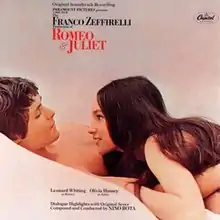Romeo and Juliet (1968 film soundtrack)
The soundtrack for the 1968 film Romeo and Juliet was composed and conducted by Nino Rota. It was originally released as a vinyl record, containing nine entries, most notably the song "What Is a Youth", composed by Nino Rota, written by Eugene Walter and performed by Glen Weston. The music score won a Silver Ribbon award of the Italian National Syndicate of Film Journalists in 1968[1] and was nominated for two other awards (BAFTA Award for Best Film Music in 1968[2] and Golden Globe Award for Best Original Score in 1969).[1]
| Romeo and Juliet 1968 film soundtrack | |
|---|---|
 | |
| Soundtrack album by | |
| Released | October 8, 1968 |
| Genre | Film score |
| Label | Capitol |
| Producer | Neely Plumb |
The soundtrack is referred to as "Original Soundtrack Recording" on the front cover with further credits to the film itself. Several other editions of the soundtrack feature different covers.
Composition
The original track list includes anthems, song snatches, compositions for the ball and for a strolling trombone player.[3]
The neo-Elizabethan ballad "What Is a Youth" is performed by a troubadour character as part of the diegesis during the Capulets' ball, at which Romeo and Juliet first meet. The original lyrics of "What Is a Youth" are borrowed from songs in other Shakespearean plays, particularly Twelfth Night and The Merchant of Venice.[4] Although Rota's original manuscript is believed to be lost,[5] the love theme is known to have an original published key of G minor.[6] Romeo's theme was described as "a slow-paced minor key idea, first played by a solo English horn with strings".[7] In the scene, where Romeo sees Juliet dancing with her family, the theme is sounded by a solo oboe over a background of tremolo strings.[7]
Reception
In 1968 Billboard described the score as "brilliant and moving".[8] Contemporary feedback was also provided by John Mahoney from The Hollywood Reporter, who described the score as "one of the best and strongest components", noting that "a period ballad with lyric by Eugene Walter, 'What Is a Youth', provides the perfect setting for the meeting of the two lovers at the Capulet party".
Subsequently Professor of English and Shakespearean literature scholar Jill L. Levenson wrote that Rota's score "heightened the sentiment of the lovers' relationship, doing little for their verisimilitude".[3] According to a BBC review, "the suite from Romeo and Juliet is a florid symphony drawing on Rota's classical background for its lush themes – swaggering hunting horn for the amorous swain, mournful lute for the awakening girl".[9]
On the other hand, critic Jack Jorgens dismissed "What Is a Youth" for being "sickly sweet".[10] On Rate Your Music the soundtrack has a score of 3.89 out of 5, based on 55 ratings as of October 2013.[11]
The Love Theme provides the background to the narrative of Our Tune, a long-standing feature on British radio hosted by Simon Bates.
Arrangements
Since 1968 numerous arrangements of "What Is a Youth" have been released, most notably "A Time for Us" and "Ai Giochi Addio", both performed by various artists. The soundtrack's original label Capitol Records subsequently released three other soundtrack albums inspired by the original score. The popularity of the first of them led Capitol Records to release a four-record set of the film's entire vocal and music tracks. On June 25, 2002 the City of Prague Philharmonic Orchestra released their own arrangement of the soundtrack on the Silva America label.[5] Other arrangements were made by André Rieu, Henry Mancini (a top ten hit in 1969), Jet Stream Orchestra, and others. Lana Del Rey's song "Old Money" from her 2014 album Ultraviolence contains samples from "What Is a Youth".
Original track list
- Side One
- "Prologue" 2:46
- "What Is a Youth" 7:24
- "The Balcony Scene" 9:26
- Side Two
- "Romeo & Juliet Are Wed" 3:00
- "The Death Of Mercutio And Tybalt" 3:35
- "Farewell Love Scene" 4:21
- "The Likeness Of Death" 2:36
- "In Capulet's Tomb" 7:22
- "All Are Punished" 2:07
See also
References
- "Nino Rota Awards & nominations". PNOP. Retrieved 28 December 2012.
- "Film Nominations 1968". BAFTA. Archived from the original on 6 October 2013. Retrieved 28 December 2012.
- Levenson, Jill (1987). Romeo and Juliet. Manchester University Press. p. 103. ISBN 0719022185.
- The Cambridge Companion to Shakespeare and Popular Culture. Cambridge University Press. 2007. pp. 156–157. ISBN 978-0521844291.
- "Prague Philharmonic Orchestra - Franco Zeffirelli's Romeo & Juliet Soundtrack Audio CD". CD Universe. Retrieved 27 December 2012.
- "Romeo and Juliet (Love Theme)". Musicnotes. Retrieved 28 December 2012.
- MacDonald, Laurence (1998). The Invisible Art of Film Music: A Comprehensive History. Scarecrow Press. p. 215. ISBN 188015756X.
- "Album Reviews". Billboard: 22. 19 Oct 1968. Retrieved 28 December 2012.
- Morag Reavley (2003-06-24). "The Essential Film Music of Nino Rota Review". BBC. Retrieved 27 December 2012.
- Heil, Bodo (2004). Shakespeare's "Romeo and Juliet" in the movies: Comparing Franco Zeffirelli's (1968) and Baz Luhrmann's (1996) film versions. GRIN Verlag. p. 18. ISBN 3638269809.
- "Romeo & Juliet". Rate Your Music. Retrieved 28 October 2013.